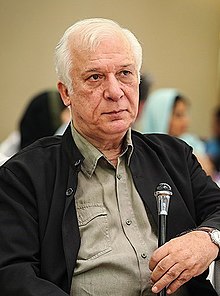Khosrow Sinai
Khosrow Sinai | |
|---|---|
 | |
| Born | January 19, 1941 |
| Occupation(s) | Film director, Screenwriter, music composer |
| Spouse(s) | Gizella varga Sinai(1967-present) , Farah Osouli (1975-Persent) |
| Children | Yasmin Sinai, Samira Sinai, Sam Sinai, Alma Sinai |
Khosrow Sinai (Persian: خسرو سینایی, born 19 January 1941 in Sari, Iran) is an Iranian film director. His works are usually based on social documentations. He was the first Iranian film director to win an international prize after the Islamic revolution in Iran.[citation needed] He is also known as an Iranian scholar and has been awarded the Knight's Cross of the Order of Merit of the Republic of Poland.
Biography
This section of a biography of a living person does not include any references or sources. (April 2011) |
He graduated from Alborz highschool in 1958 (Tehran), and then went to Austria for further education where he spent four years studying Architecture at the Vienna University of Technology and three years study in music composition at the Vienna Academy of Music and Dramatic Arts.
He graduated in music education from the Vienna Music Conservatory as a high honoured student. Finally he graduated as cinema and TV director (main study) and screenplay writing (subsidiary study) from Vienna Academy of Music and Dramatic Arts (with an honours degree).
In 1963 he also published a poetry collection Muds Blisters.
After these years of study he returned to Iran in 1967 and worked in the Ministry of Culture and Arts (till 1972), and as instructor in various universities in the fields of screenplay writing and documentary film until 1992.
He also worked in National Iranian Television (now called Seda o Sima) as producer, screenplay writer, director, and editor making about 100 short films, documentaries, and features. He is best known for his Avant-garde documentaries and also his unique style in docu-drama. He has been a juror in several national and foreign film festivals.
Albeit he made a lot of films and is respected as one of the best Iranian Film makers among intellectuals, he is not as much famous in public because of his negative attitude towards press, and vice versa.
"Arouse Atash", (Bride of Fire)was one of his most successful films in box office, and attracted a lot of attention both by public and critique.
Filmography
Some of his features are:
- 1979 - Long live (Persian: زنده باد, Zendeh bad)
- 1980 - Viva ...!,, award winner in Karlovy Vary Film Festival
- 1983 - The Inner Beast (Persian: هیولای درون, Hayula-ye darun) (2nd Fajr Festival as the best director)
- 1983 - The Lost Requiem (oryg. title: Marsiye-ye gomshode, مرثیه گمشده) (documentary about the Poles who found refuge in Iran during World War II, after being forcibly taken to Soviet labor camps in Siberia)
- 1987 - Going astray... (oryg. Persian title: Yar dar khaneh..., ...یار در خانه, meaning "A friend at home")
- 1990 - In the Alleys of Love, presented at the Un Certain Regard section at the 1991 Cannes Film Festival[1]
- 1997 - Autumn Alley (documentary/fiction), shown at the IDFA Film Festival - Amsterdam
- 1999 - The Bride of Fire, award winning in several national and foreign festivals
- 2005 - Talking with a Shadow (Persian: Goftogu ba sayeh گفت و گو با سایه) (docudrama about Sadeq Hedayat)
- 2005 - The Carpet, the Horse, the Turkoman (Persian: فرش، اسب، ترکمن, Farsh, asb, Torkaman)
- 2006 - The Desert of Blood (Persian: کویر خون, Kawir-e khun)
- 2014 - Rainbow Island (Persian: جزیره رنگین, Jazire-ye rangin)
Published books and screenplays
- The Man in White
- The Artists of a Bloodshedding Era
- The Bride of Fire (Film Script)
- The Post-communist Cinema (translated from English).
- The Lost Requiem
- Translation from German: My Journey and Adventures in Iran, a book by Ármin Vámbéry (1863).
He is also writing and translating numerous essays about cinema and other fine arts.[citation needed]
See also
Relatives
Osouli Family
- Farah Osouli is a well known artist
References
- ^ "Festival de Cannes: In the Alleys of Love". festival-cannes.com. Retrieved 9 August 2009.
External links
- Official website
- Template:Fa icon Khosrow Sinai honoured in Poland - BBC
- Michaël Abescassis, Impressions of an Auteur, Tehran Today: Talking with Iranian Director Khosrow Sinai, Bright Lights Film Journal, May 2009, [1].
- Ryszard Antolak, The Lost Requiem of Khosrow Sinai, Persian Journal, 25 November 2007, [2].
The Lost Requiem: Khosrow Sinai's priceless Iranian and Polish historical document, The Iranian, 26 November 2007, [3]. - Khosrow Sinai, The passing of the Polish through Iran (Gozar-e Lahestāni-hā az Iran), in Persian, Jadid Online, 28 May 2009, (Persian), (English).
An audio slideshow by Shokā Sahrā'i (with English subtitles): [4] (7 min 46 sec).
